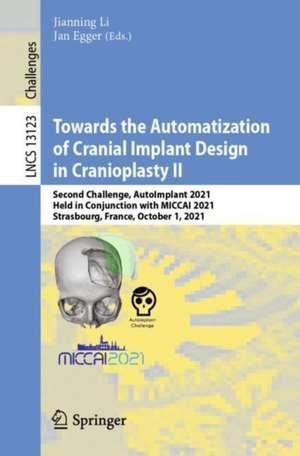Towards the Automatization of Cranial Implant Design in Cranioplasty II: Second Challenge, AutoImplant 2021, Held in Conjunction with MICCAI 2021, Strasbourg, France, October 1, 2021, Proceedings: Lecture Notes in Computer Science, cartea 13123
Editat de Jianning Li, Jan Eggeren Limba Engleză Paperback – 4 dec 2021
The 7 papers are presented together with one invited paper, one qualitative evaluation criteria from neurosurgeons and a dataset descriptor. This challenge aims to provide more affordable, faster, and more patient-friendly solutions to the design and manufacturing of medical implants, including cranial implants, which is needed in order to repair a defective skull from a brain tumor surgery or trauma. The presented solutions can serve as a good benchmark for future publications regarding 3D volumetric shape learning and cranial implant design.
Din seria Lecture Notes in Computer Science
- 20%
 Preț: 1061.55 lei
Preț: 1061.55 lei - 20%
 Preț: 307.71 lei
Preț: 307.71 lei - 20%
 Preț: 438.69 lei
Preț: 438.69 lei - 20%
 Preț: 579.30 lei
Preț: 579.30 lei -
 Preț: 410.88 lei
Preț: 410.88 lei - 17%
 Preț: 427.22 lei
Preț: 427.22 lei - 20%
 Preț: 596.46 lei
Preț: 596.46 lei - 15%
 Preț: 448.04 lei
Preț: 448.04 lei - 20%
 Preț: 353.50 lei
Preț: 353.50 lei -
 Preț: 389.49 lei
Preț: 389.49 lei - 20%
 Preț: 309.90 lei
Preț: 309.90 lei - 20%
 Preț: 645.28 lei
Preț: 645.28 lei - 20%
 Preț: 763.23 lei
Preț: 763.23 lei - 15%
 Preț: 580.46 lei
Preț: 580.46 lei - 20%
 Preț: 310.28 lei
Preț: 310.28 lei - 20%
 Preț: 655.02 lei
Preț: 655.02 lei - 20%
 Preț: 1183.14 lei
Preț: 1183.14 lei - 20%
 Preț: 340.32 lei
Preț: 340.32 lei -
 Preț: 449.57 lei
Preț: 449.57 lei - 20%
 Preț: 591.51 lei
Preț: 591.51 lei - 18%
 Preț: 938.83 lei
Preț: 938.83 lei - 20%
 Preț: 337.00 lei
Preț: 337.00 lei - 20%
 Preț: 649.50 lei
Preț: 649.50 lei - 20%
 Preț: 607.40 lei
Preț: 607.40 lei - 20%
 Preț: 1414.79 lei
Preț: 1414.79 lei - 20%
 Preț: 1024.44 lei
Preț: 1024.44 lei - 20%
 Preț: 583.40 lei
Preț: 583.40 lei - 20%
 Preț: 453.32 lei
Preț: 453.32 lei - 20%
 Preț: 575.49 lei
Preț: 575.49 lei - 20%
 Preț: 1075.26 lei
Preț: 1075.26 lei - 20%
 Preț: 585.88 lei
Preț: 585.88 lei - 20%
 Preț: 825.93 lei
Preț: 825.93 lei - 17%
 Preț: 360.20 lei
Preț: 360.20 lei - 20%
 Preț: 763.23 lei
Preț: 763.23 lei - 20%
 Preț: 340.32 lei
Preț: 340.32 lei - 20%
 Preț: 504.58 lei
Preț: 504.58 lei - 20%
 Preț: 369.13 lei
Preț: 369.13 lei - 20%
 Preț: 580.93 lei
Preț: 580.93 lei - 20%
 Preț: 343.62 lei
Preț: 343.62 lei - 20%
 Preț: 350.21 lei
Preț: 350.21 lei - 20%
 Preț: 583.40 lei
Preț: 583.40 lei - 20%
 Preț: 583.40 lei
Preț: 583.40 lei - 15%
 Preț: 438.59 lei
Preț: 438.59 lei - 20%
 Preț: 341.95 lei
Preț: 341.95 lei - 20%
 Preț: 238.01 lei
Preț: 238.01 lei - 20%
 Preț: 538.30 lei
Preț: 538.30 lei
Preț: 353.10 lei
Preț vechi: 441.38 lei
-20% Nou
Puncte Express: 530
Preț estimativ în valută:
67.59€ • 73.44$ • 56.81£
67.59€ • 73.44$ • 56.81£
Carte tipărită la comandă
Livrare economică 22 aprilie-06 mai
Preluare comenzi: 021 569.72.76
Specificații
ISBN-13: 9783030926519
ISBN-10: 3030926516
Pagini: 129
Ilustrații: IX, 129 p. 76 illus., 67 illus. in color.
Dimensiuni: 155 x 235 mm
Greutate: 0.2 kg
Ediția:1st ed. 2021
Editura: Springer International Publishing
Colecția Springer
Seriile Lecture Notes in Computer Science, Image Processing, Computer Vision, Pattern Recognition, and Graphics
Locul publicării:Cham, Switzerland
ISBN-10: 3030926516
Pagini: 129
Ilustrații: IX, 129 p. 76 illus., 67 illus. in color.
Dimensiuni: 155 x 235 mm
Greutate: 0.2 kg
Ediția:1st ed. 2021
Editura: Springer International Publishing
Colecția Springer
Seriile Lecture Notes in Computer Science, Image Processing, Computer Vision, Pattern Recognition, and Graphics
Locul publicării:Cham, Switzerland
Cuprins
Personalized Calvarial Reconstruction in Neurosurgery.- Qualitative Criteria for Designing Feasible Cranial Implants.- Segmentation of Defective Skulls from CT Data for Tissue Modelling.- Improving the Automatic Cranial Implant Design in Cranioplasty by Linking Different Datasets.- Learning to Rearrange Voxels in Binary Segmentation Masks for Smooth Manifold Triangulation.- A U-Net based System for Cranial Implant Design with Pre-processing and Learned Implant Filtering.- Sparse Convolutional Neural Network for Skull Reconstruction.- Cranial Implant Prediction by Learning an Ensemble of Slice-based Skull Completion networks.- PCA-Skull: 3D Skull Shape Modelling Using Principal Component Analysis.- Cranial Implant Design using V-Net based Region of Interest Reconstruction.
